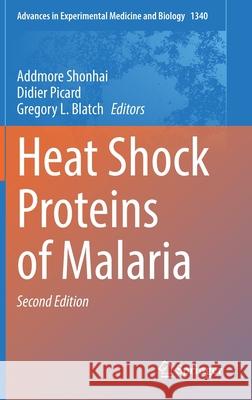Heat Shock Proteins of Malaria » książka



Heat Shock Proteins of Malaria
ISBN-13: 9783030783969 / Angielski / Twarda / 2021 / 277 str.
Heat Shock Proteins of Malaria
ISBN-13: 9783030783969 / Angielski / Twarda / 2021 / 277 str.
(netto: 653,27 VAT: 5%)
Najniższa cena z 30 dni: 655,41
ok. 16-18 dni roboczych.
Darmowa dostawa!
Acknowledgements
Contributors
About the Editors
Addmore Shonhai is a full Professor in Protein Biochemistry and head of the department of Biochemistry at the University of Venda, South Africa. His research focuses on understanding the role of heat shock proteins in parasite cyto-protection and virulence. He is particularly interested in studying the structure-function features of heat shock proteins that are responsible for their unique roles in various organisms despite their apparent sequence conservation. He is a recipient of a prestigious Georg Foster Research Fellowship awarded by the Alexander von Humboldt (AvH) of Germany and is a life-time member of the AvH fellowship program. His research has been primarily funded by the Germany Research Foundation (DFG) and National Research Foundation of South Africa. His passion is to train student scientists from disadvantaged background. In addition, he is interested in sharing his skills with collaborators from around the world but is especially interested in promoting science in Africa. To this end, he has conducted several workshops on protein biochemistry and molecular biology held at various institutions such as Babcock University, Obafemi Awolowo University, Nigeria Institute of Medical Research, and the University of Zimbabwe Medical School.
Didier Picard is a cellular and molecular biologist with almost 40 years of experience in basic research in academia. He obtained his PhD from the University of Zurich, Switzerland. Following a postdoc at the University of California in San Francisco, California, he became a full professor at the Department of Cell Biology at the University of Geneva, Switzerland. He has served as departmental chair and president of biology at the University of Geneva. His research interests include molecular chaperones (in vivo functions of Hsp90 and its cofactors) and steroid receptors (mechanisms of transcriptional activation of the estrogen receptor a, signaling crosstalk, antiestrogen resistance of breast cancer). He is the initiator and organizer of a twenty-year-old series of conferences dedicated to Hsp90, and most recently of a webinar series. He is a member of the European Molecular Biology Organization (EMBO), serves on the editorial boards of several scientific journals, and is currently president of the learned society "Life Sciences Switzerland".
Gregory L. Blatch has worked in academia for over 30 years, and his contributions to the academy and the promotion of science more broadly have been recognized through a number of awards (e.g. Senior Fellow of the Cell Stress Society International, FCSSI). He completed his PhD at the University of Cape Town and conducted postdoctoral research at Harvard University, before taking up academic teaching and research positions. He has a keen interest in the role of mentorship in the development of academic and research capability, and he has played a foundational leadership role at institutional, national and international levels in building academic and research entities. He is currently Emeritus Professor at The University of Notre Dame Australia, having most recently served as Pro Vice-Chancellor Research at Notre Dame. His personal research interests fall within the broad field of cellular stress biology, and he has been internationally recognized for his work on the role of stress in disease (e.g. cancer) and infection (e.g. malaria).
1997-2026 DolnySlask.com Agencja Internetowa
KrainaKsiazek.PL - Księgarnia Internetowa









